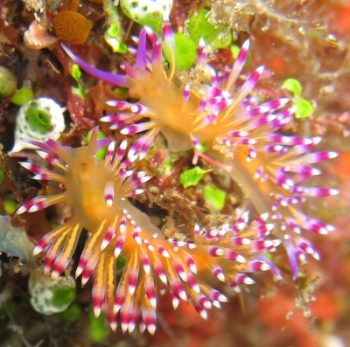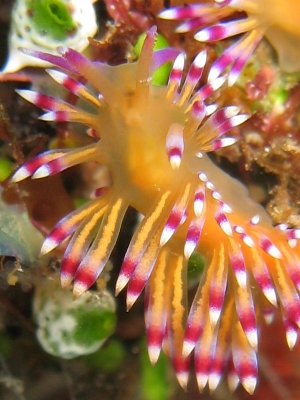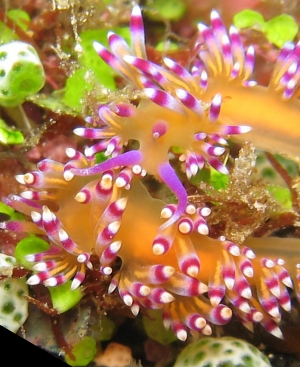
Flabellina cf exoptata
Order: NUDIBRANCHIA
Suborder: AEOLIDINA
Family: Flabellinidae
PHOTO
Locality: Maldives, 15 meters, Banana reef, North Male atoll, Indian Ocean, 1 January 2008, On the reef. Length: 2 cm. Photographer: Marcel Tanke.
The rhinophores appear to have papillae on the posterior side which is the same as F. exoptata and the overall colour is very similar except for the yellow digestive gland ducts and the orange tinge all over. However the yellow colour of the digestive gland ducts is a result of the colour of the hydroids they have been eating and the orange tinge could also be a result of that as well. My major concern is that the cerata appear to be in double rows rather than the single rows normally found in F. exoptata.
Authorship detailsRudman, W.B., 2008 (July 11) Flabellina cf exoptata [In] Sea Slug Forum. Australian Museum, Sydney. Available from http://www.seaslugforum.net/find/flabcfexop
Related messages
Flabellina exoptata ? from the Maldives
July 11, 2008
From: Marcel Tanke

Hi Bill,
I looked on some websites / books and the closest I found for this was Flabellina exoptata.
Locality: Maldives, 15 meters, Banana reef, North Male atoll, Indian Ocean, 1 January 2008, On the reef. Length: 2 cm. Photographer: Marcel Tanke.
But it might be some variation as the color / structure of the rhinophores (and tentacles) are different.
What's your opinion?
Thanks and regards,
Marcel
Marceltanke@cs.com



Dear Marcel,
The rhinophores appear to have papillae on the posterior side which is the same as F. exoptata and the overall colour is very similar except for the yellow digestive gland ducts and the orange tinge all over. However the yellow colour of the digestive gland ducts is a result of the colour of the hydroids they have been eating and the orange tinge could also be a result of that as well. My major concern is that the cerata appear to be in double rows rather than the single rows normally found in F. exoptata.
I think I will put it on a Flabellina cf. exoptata page so we don't forget it.
Best wishes,
Bill Rudman
